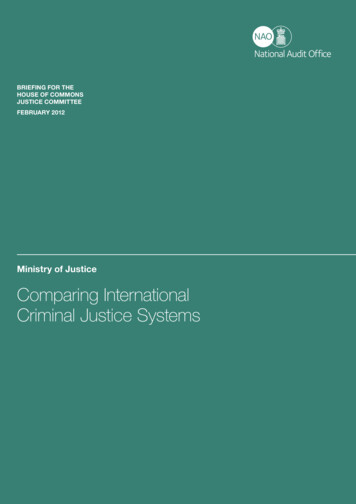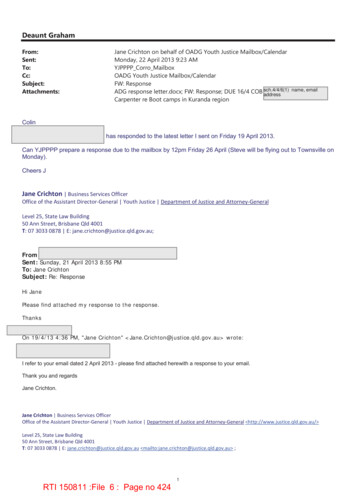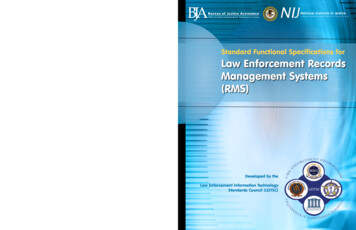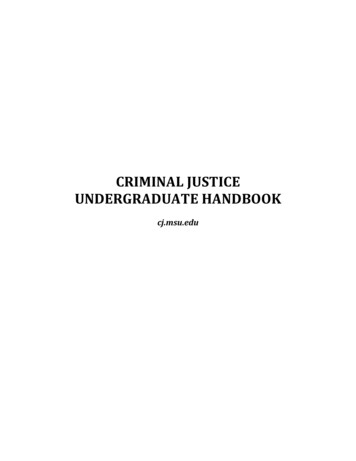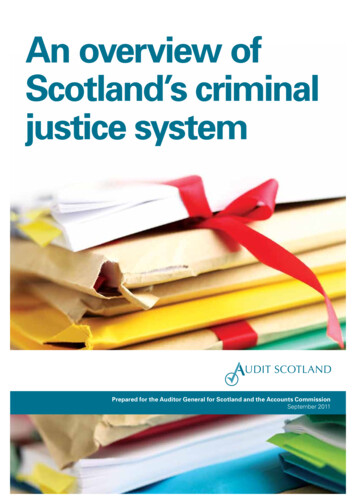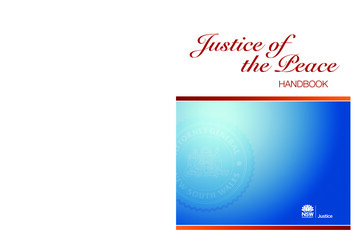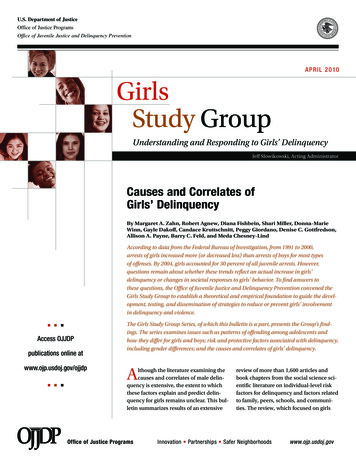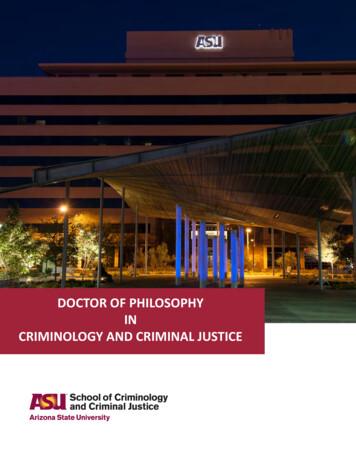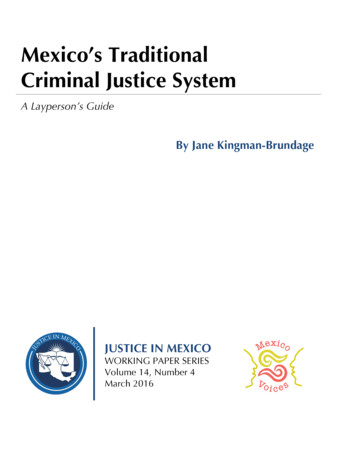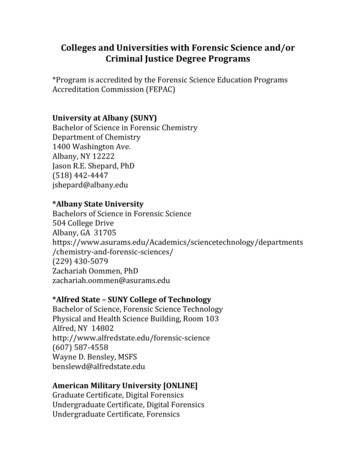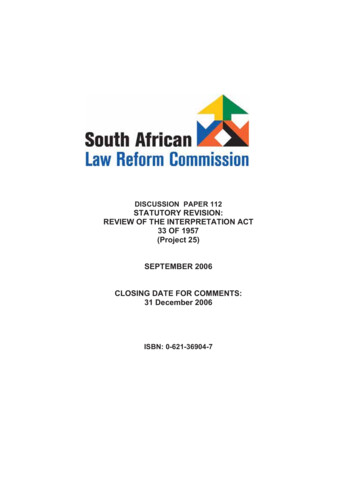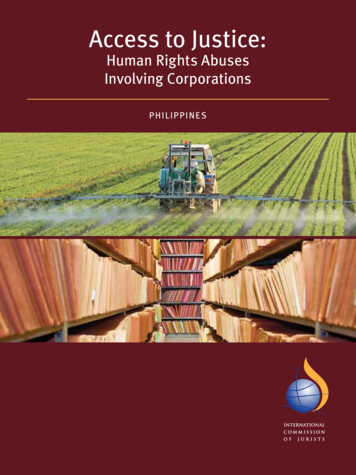
Transcription
Access to Justice:Human Rights AbusesInvolving CorporationsPHIL IPPINE S
International Commission of JuristsThe International Commission of Jurists (ICJ) is a non-governmental organisationdevoted to promoting the understanding and observance of the rule of law and thelegal protection of human rights throughout the world. It is headquartered in Geneva,Switzerland, and has many national sections and affiliated organisations. It enjoysconsultative status in the United Nations Economic and Social Council, UNESCO,the Council of Europe and the African Union. The ICJ maintains cooperative relationswith various bodies of the Organization of American States.P.O. Box 9133 Rue des BainsCH-1211 Geneva 8SwitzerlandE-mail: info@icj.orgwww.icj.org
PresidentMrs. Mary ROBINSON, IrelandVice-PresidentsJustice John DOWD, AustraliaProfessor Pedro NIKKEN, VenezuelaExecutive CommitteeDr. Rajeev DHAVAN, IndiaProfessor Vojin DIMITRIJEVIC, SerbiaJustice Unity DOW, BotswanaDr. Gustavo GALLÓN GIRALDO, ColombiaLegal Council Stellan GÄRDE, SwedenProfessor Robert GOLDMAN, United States ofAmericaMs. Karinna MOSKALENKO, RussiaJustice Michèle RIVET, CanadaMr. Raji SOURANI, PalestineOther Commission MembersMr. Muhannad AL-HASANI, SyriaMr. Ghanim ALNAJJAR, KuwaitMr. Raja AZIZ ADDRUSE, MalaysiaProfessor Abdullahi AN-NA’IM, SudanJustice Solomy BALUNGI BOSSA, UgandaMr. Abdelaziz BENZAKOUR, MoroccoJustice Ian BINNIE, CanadaProfessor Alexander BRÖSTL, SlovakiaJustice Arthur CHASKALSON, South AfricaProfessor Santiago CORCUERA, MexicoProfessor Louise DOSWALD-BECK, SwitzerlandJustice Hisham EL-BASTAWISI, EgyptProfessor Paula ESCARAMEIA, PortugalJustice Elisabeth EVATT, AustraliaProfessor Jochen A. FROWEIN, GermanyMr. Roberto GARRETÓN, ChileProfessor Jenny E. GOLDSCHMIDT, NetherlandsProfessor Michelo HANSUNGULE, ZambiaJustice Moses HUNGWE CHINHENGO,ZimbabweMs. Asma JAHANGIR, PakistanMs. Imrana JALAL, FijiProfessor David KRETZMER, IsraelProfessor Kazimierz Maria LANKOSZ, PolandMag. José Antonio MARTíN PALLíN, SpainJustice Charles MKANDAWIRE, MalawiMr. Kathurima M’INOTI, KenyaJudge Sanji MONAGENG, BotswanaProfessor Iulia MOTOC, RomaniaProfessor Vitit MUNTARBHORN, ThailandProfessor Manfred NOWAK, AustriaDr. Jorge Eduardo PAN CRUZ, UruguayProfessor Andrei RICHTER, RussiaProfessor Sir Nigel RODLEY, United KingdomProfessor Claes SANDGREN, SwedenMr. Belisário DOS SANTOS JUNIOR, BrazilJustice Philippe TEXIER, FranceProfessor Daniel THÜRER, SwitzerlandProfessor U. Oji UMOZURIKE, NigeriaJustice Vilenas VADAPALAS, LituaniaProfessor Yozo YOKOTA, JapanProfessor Leila ZERROUGUI, AlgeriaJustice E. Raúl ZAFFARONI, ArgentinaHonorary MembersProfessor Georges ABI-SAAB, EgyptJustice P.N. BHAGWATI, IndiaDr. Boutros BOUTROS-GHALI, EgyptMr. William J. BUTLER, United States ofAmericaProfessor Antonio CASSESE, ItalyJustice Arthur CHASKALSON, South AfricaJustice Marie-José CRESPIN, SenegalDato’ Param CUMARASWAMY, MalaysiaDr. Dalmo A. DE ABREU DALLARI, BrazilProfessor Alfredo ETCHEBERRY, ChileLord William GOODHART, United KingdomJustice Lennart GROLL, SwedenMr. Louis JOINET, FranceJustice P.J.G. KAPTEYN, NetherlandsJustice Michael D. KIRBY, AustraliaProfessor Kofi KUMADO, GhanaProfessor Jean Flavien LALIVE, SwitzerlandJustice Claire L’HEUREUX-DUBÉ, CanadaDr. Rudolf MACHACEK, AustriaProfessor Daniel H. MARCHAND, FranceMr. J.R.W.S. MAWALLA, TanzaniaMr. François-Xavier MBOUYOM, CameroonMr. Fali S. NARIMAN, IndiaProfessor Manfred NOWAK, AustriaSir Shridath S. RAMPHAL, GuyanaDr. Bertrand RAMCHARAN, GuyanaProfessor Daniel THÜRER, SwitzerlandProfessor Christian TOMUSCHAT, GermanyMr. Michael A. TRIANTAFYLLIDES, CyprusProfessor Theo VAN BOVEN, NetherlandsProfessor Luzius WILDHABER, SwitzerlandProfessor José ZALAQUETT, Chile
Access to justice and effective legal remedies are crucial elements in the protection ofhuman rights in the context of business activities. It is also relevant to the work ofjudges and lawyers who promote the rule of law and human rights. Despite its importance, access to justice is hindered by a number of obstacles unique to corporatehuman rights abuses. The study of state practices in providing access to justice revealsthe potential of existing instruments to ensure this right. Scrutiny of state practices inthis area will help the international community in its quest for new answers to thechallenge of transnational corporate human rights abuse.This study surveys the international and domestic legal framework applicable in engaging the liability of business enterprises for human rights and environmental abusesoccurring in the Philippines. The domestic law of the Philippines does provide, substantively and procedurally, for some measure of judicial and/or administrative remedy forvictims of human rights abuse by corporations and other business enterprises. Nonetheless, as the study illustrates, access to justice for such victims remains highlylimited. Major obstacles include the murky or impenetrable corporate structures ofalleged abusive companies; prohibitive fees imposed on claimants, and disincentivesfor pursuing remedies, which may arise from incidence or threats of violence, reprisals,or counter-litigation. Despite their prevalence, these obstacles are not always insurmountable. By reducing fees and processing times of human rights claims, providingtraining on technical elements of human rights law to the judiciary, and reforming lawto enforce corporate transparency, the study suggests that the Filipino justice systemcan be modified to more effectively provide for adequate remedies in cases of corporatehuman rights abuse.International Commission of JuristsP.O. Box 9133 Rue des BainsCH-1211 Geneva 8SwitzerlandISBN 978-92-9037-148-X
Access to Justice:Human Rights AbusesInvolving CorporationsPhilippinesA Project of the International Commission of Jurists
Copyright International Commission of JuristsThe ICJ permits free reproduction of extracts from any of itspublications provided that due acknowledgment is given and acopy of the publication carrying the extract is sent to its headquarters at the following address:International Commission Of JuristsP.O. Box 9133, rue des BainsGenevaSwitzerland Access to Justice: Human Rights Abuses InvolvingCorporations – PhilippinesISBN: 978-92-9037-148-XGeneva, 2010
Access to Justice:Human Rights AbusesInvolving CorporationsPhilippinesA Project of the International Commission of Jurists
This study was researched and drafted by Attorneys Joselito S. Calivoso, Jr.,Aison S. Garcia, Raymond Q. Salas, and Arnold F. de Vera from the SentrongAlternatibong Lingap Panligal (SALIGAN) Alternative Legal Assistance Centre,Phlippines. Ian Seiderman did the final review at the ICJ. This study is part ofthe larger ICJ project on Access to Justice and Legal Remedies in cases of humanrights abuse involving companies under the direction of Carlos Lopez. PriyamvadaYarnell coordinated the production of the publication.AcknowledgementsThe International Commission of Jurists expresses its gratitude to persons, lawyersand judges who provided information or made themselves available for interviewsin the context of this study.1. Commissioner Jose Manuel Mamauag, Commission on Human Rights2. Dean Raul C. Pangalangan, University of the Philippines College of Law3. Professor H. Harry L. Roque, Jr. University of the Philippines College of Law,Chairperson of the Center for International Law (CENTERLAW)4. Professor Virgilio R. Delos Reyes, De La Salle University College of Law5. Hon. Loretta Ann Rosales, former representative, House of Representative,Akbayan!6. Dr. Nymia Pimentel-Simbulan, Executive Director of the Philippine HumanRights Information Center (PHILRIGHTS)7. Atty. Maria Luz G. Luna, President, Board of Trustees, Tanggol Kalikasan(Defense of Nature)8. Professor Marlon J. Manuel, Ateneo de Manila School of Law9. Judge Tita B. Alisuag, Presiding Judge, Branch 1, Manila Regional Trial Court10. Mr. Daniel L. Edralin, Chairperson, Alliance of Progressive Labor11. Mr. Marlon R. Marquez, Executive Director of Institute of Corporate Directors12. Atty. Vincent Edward R. Festin13. Ms. Abbie Santos-Dulay, Network for Fisheries Reform (NFR)14. Ms. Lolita Sionosa, Social Action Center, Marbel, North Cotabato15. Atty. Reeza A. Singzon16. Atty. Melizel F. AsuncionThe ICJ gratefully acknowledges the financial support to this project fromMISEREOR.
This project is funded by the European Union.http://ec.europa.eu/world/This publication has been produced with the assistance of the European Union.The contents of this publication are the sole responsibility of the InternationalCommission of Jurists and can in no way be taken to reflect the views of theEuropean Union.
PhilippinesviiTable of ContentsIntroduction 11. Legal Liability for Corporations under National Law 31.1 International Conventions 31.2 Constitution 51.3 Statutes 61.3.1 Civil liability 61.3.1.1 Civil Code 61.3.1.2 Other Laws 91.3.2 Criminal liability 92. Legal Remedies for Corporate Human Rights Abuses 2.1 Judicial remedies 12122.1.1 Initiating Civil Cases 132.1.2 Initiating Criminal Cases 132.1.3 Pauper Litigants, exception to filing fees 142.1.4 New Rules of Procedure For Environmental Cases 152.2 Administrative Remedies 172.2.1 Environment 172.2.2 Labour 192.2.3 Agrarian Laws 232.3 The Commission on Human Rights 252.4 Executive Agencies 263. Obstacles to Accessing Justice 3.1 Corporate personality; piercing the corporate veil andcomplex corporate structures 2727
viiiAccess to Justice: Human Rights Abuses Involving Corporations3.2 Jurisdiction Over Foreign Corporation as Respondent 313.3 Forum Non Conveniens 333.4 Prescription 343.5 Legal standing 353.6 Legal Fees and Legal Representation 363.7 Protracted length of proceedings 403.8 Equality of arms and evidentiary problems 413.9 Other obstacles 423.9.1 Violence 3.10 Harassment of victims and their lawyers 4243Conclusions and Recommendations 45Bibliography 50Annex I. Bill Of Rights 59Annex II. Social Justice And Human Rights 62
PhilippinesIntroductionThe present country study discusses Philippine laws relevant to the question ofhuman rights abuse involving corporations. It focuses on remedies available toaffected persons, identifies obstacles surrounding access to justice, and makesrecommendations on how to overcome these obstacles. The study results from aprocess that started with a comprehensive review of Philippine law, policy, andcases decided by the Philippine Supreme Court. An initial draft was prepared andthen presented for discussion by various experts and stakeholders in a workshopheld in Manila on April 20 and 21, 2010.1 The discussions at the workshop led tothe final and present form of the study.Access to justice and effective legal remedies are crucial elements in the protection of human rights in the context of business activities. They are speciallyrelevant to the work of judges and lawyers who promote the rule of law and humanrights. Despite its importance, access to justice is hindered by a number of obstacles unique to corporate human rights abuses. The study of state practices inproviding access to justice reveals the potential of existing instruments to ensurethis right. Scrutiny of state practices in this area will help the international community in its quest for new answers to the challenge of transnational corporatehuman rights abuse.To contribute to the understanding of the problem and to assist in the formulationof a new agenda to strengthen access to legal remedies in the context of business abuse, the International Commission of Jurists (ICJ) has carried out a projectaddressing Access to Justice for victims of corporate human rights abuse. Thisproject comprises a series of country studies (Brazil, Colombia, People’s Republicof China, Democratic Republic of the Congo, India, The Netherlands, Nigeria, thePhilippines, Poland and South Africa) and questionnaires for additional countries.The present study is one of the country studies.The study follows the definitions and methodology adopted by the broader ICJAccess to Justice Project. The present study is based on in-country research,consultation with a number of experts and a national workshop held in Manilaon April 20 and 21 April 2010 jointly organized by the ICJ and SALIGAN, wheresome 40 judges, lawyers, academics and civil society and National Human RightsCommission representatives were in attendance.The study begins with the survey of human rights treaties to which the Philippinesis a party and goes on to discuss Philippine laws and cases relating and relevantto corporations with a focus on the norm of conduct, penalties for wrongdoing,1.Workshop on Access to Justice For Human Rights Abuse Involving Corporations: Gaps andRecommendations (The Philippine Workshop), April 20-21, 2010, Century Park Hotel Manila.1
2Access to Justice: Human Rights Abuses Involving Corporationsand remedies available to affected persons. The following section discusses theprincipal obstacles to access to justice in the Philippines in relation to corporateabuse of human rights. Conclusions are offered next, followed by recommendations to address major obstacles to access to justice.
Philippines1. Legal Liability for Corporations underNational LawThis section provides an overview of the legal framework relevant to the liabilityof corporations for human rights abuses and assesses the Philippine Constitutionand statutes, both general and specific in application. Where relevant, rulings ofthe Philippine Supreme Court are also discussed.21.1 International ConventionsThe Philippines is party to a significant number of international human rightstreaties. It has likewise signed other significant international human rights instruments. Both the direct observance and the protection from abuse by third parties,including corporations, of the rights contained in these instruments is incumbentupon the Philippines.In particular, the Philippines signed and ratified the International Covenant onCivil and Political Rights (ICCPR), the First Optional Protocol to the InternationalCovenant on Civil and Political Rights (ICCPR-OP1), the Second Optional Protocolto the International Covenant on Civil and Political Rights (ICCPR-OP2) aimed atthe abolition of the death penalty, the International Covenant on Economic, Socialand Cultural Rights (ICESCR), the International Convention on the Abolition of AllForms of Racial Discrimination (ICERD), the Convention on the Elimination of AllForms of Racial Discrimination Against Women (CEDAW), the Optional Protocol tothe Convention on the Elimination of All Forms of Discrimination Against Women(CEDAW-OP), the Convention on the Rights of the Child (CRC) and the OptionalProtocol to the Convention on the Rights of the Child (CRC-OP-AC) on the involvement of children in armed conflict, the First Optional Protocol to the Conventionon the Rights of the Child (CRC-OP-SC) on the sale of children, child prostitutionand child pornography, the Convention Against Torture and Other Cruel, Inhumanor Degrading Treatment or Punishment (CAT), the International Convention on theProtection of All Migrant Workers and Members of their Families (CMW), and theConvention on the Rights of Persons with Disabilities (CRDP).The Philippines is also a party in a number of other treaties containing normative standards relevant to human rights. These instrument include the, theConvention on the Prevention and Punishment of the Crime of Genocide, theConvention on the Prohibition of the Use, Stockpiling, Production and Transferof Anti-Personnel Mines and on the Destruction (Mine Ban Treaty), the UnitedNations Convention against Corruption (with qualification), the Conventionfor the Suppression of the Traffic in Persons and of the Exploitation of the2.Republic Act No. 386, The New Civil Code of the Philippines of 1950 (Civil Code), Article 8.3
4Access to Justice: Human Rights Abuses Involving CorporationsProstitution of Others, the Convention Relating to the Status of Refugees, theConvention Relating to the Status of Stateless Persons, the Slavery Conventionof 1926, as amended, the Convention on the Non-Applicability of StatutoryWar Crimes Against Humanity, the Convention on the Political Rights ofWomen, the Convention on the Nationality of Married Woman, the KyotoProtocol to the United Nations Framework Convention on Climate Change, theBasel Convention on the Control of Transboundary Movements of HazardousWastes and their Disposal, the International Convention for the Prevention ofPollution of the Sea by Oil, the Convention on Biological Diversity (CBD), theUnited Nations Framework Convention on Climate Change (UNFCCC), the JointProtocol Relating to the Application of the Vienna Convention and the ParisConvention and the Vienna Convention on Civil Liability for Nuclear Damage.Philippines is party to a substantial number of International Labour Organization(ILO) Conventions, including Convention No. 29 and No. 105 on forced labor,Convention No. 87 on freedom of association and protection of the right to organise, Convention No. 89 on night work by women, Convention No. 90 on night workof young persons, Convention No. 94 on labour clauses, Convention No. 95 onprotection of wages, Convention No. 97 on migration of employment, ConventionNo. 98 on the right to organise and collective bargaining, Convention No. 99 onminimum wage fixing, Convention No. 100 on equal remuneration, ConventionNo. 111 on discrimination (employment and occupation), Convention No. 118 onequality of treatment on social security, Convention No. 138 on minimum age,Convention No. 141 on rural workers’ organisations, Convention No. 143 on migrantworkers, Convention No. 144 on international labour standards, Convention No.165 on social security for seafarers, Convention No. 176 on safety and health
Philippinesin mines, Convention No. 179 on recruitment and placement of seafarers andConvention No. 182 on the worst forms of child labour.1.2 ConstitutionIn the Philippines, Constitutional provisions are generally not self-executing andneed legislative action, usually through enactment of national laws, i.e. RepublicActs, to be invoked in specific cases. This is true for rights listed under the Bill ofRights3 as well as the lengthy list of guarantees under the title Social Justice andHuman Rights.4However, the Supreme Court has identified a handful of rights as “self-executory”or actionable even absent an enabling law. These may be invoked in the courseof court proceedings which typically involve the question of constitutionality ofState action that may or may not eventually affect conduct of private actors. Aleading example where private conduct is affected is the holding in Oposa et al.v Fulgencio S. Factoran Jr. et al.5 (Oposa), which states that the Constitutionalright to a “balanced and healthful ecology” is fundamental, self-executing, andjudicially enforceable, and consequently imposes upon the State the correlativeduty to refrain from impairing the environment. Even as Oposa involved an actionagainst a government agency, specifically the Department of Environment andNatural Resources (DENR), to compel it to cancel certain timber license agreements, the resolution of the case ultimately affected corporations conductinglogging activities under such agreements. The ruling in Oposa established forthe first time that Constitutional provisions on the environment may be directlyinvoked and, as will be further discussed below, also laid foundations for a newset of rules of procedure governing environmental cases.6 Thus, while provisionsof the Constitution may properly be invoked where acts of State are involved, theSupreme Court has applied them in rare cases involving private individuals7 and,indirectly, private corporations similar to Oposa.83.See Annex I.4.See Annex II.5.G.R. No. 101083, July 30, 1993 (G.R. No. 101083).6.Infra, Section 3.3.1.3.7.Zulueta v Court of Appeals, G.R. No. 107383, February 20, 1996 involves a wife obtaining photographs andlove letters kept by her husband in his private clinic without the husband’s knowledge. The Supreme Courtheld that the items were inadmissible as evidence of the infidelity of the husband for being obtained inviolation of the husband’s privacy of communication and correspondence. In Zulueta, the Supreme Courtheld that:The intimacies between husband and wife do not justify anyone of them breaking the drawersand cabinet of the other and ransacking them for any telltale evidence of marital infidelity. Aperson, by contracting marriage, does not shed his or her integrity or his right to privacy asan individual and the constitutional protection is available to him or her.8.Social Justice Society et al., v Atienza., G.R. No. 156052, February 13, 2008, involves a city ordinance ofManila which would have the effect of ceasing the operations of oil depots of the country’s large petroleum companies Chevron, Petron and Shell, in designated areas of the city. In Social Justice Society, the5
6Access to Justice: Human Rights Abuses Involving Corporations1.3 StatutesThis section discusses various statutes of the Philippines relevant to civil, criminaland administrative liability of corporations for human rights abuse.1.3.1 Civil liabilityPhilippines’ statutes govern the organization and conduct of corporations:“Any foreign corporation lawfully doing business in the Philippines shallbe bound by all laws, rules and regulations applicable to domestic corporations of the same class, except those which pertain to the creation,formation, organization or dissolution of corporations or those which fixthe relations, liabilities, responsibilities, or duties of stockholders, members, or officers of corporations to each other or to the corporation.” 9As in many other jurisdictions, under the Philippine Corporation Code, corporations acquire corporate existence and a juridical personality separately from theirshareholders, and officers.10 Necessarily, complaints alleging wrongful acts of acorporation or demanding payment or performance of corporate debts or obligations are generally directed against the corporation itself instead of its officers orstockholders. However, directors or trustees are personally and solidarily (jointlyand severally) liable under the Corporation Code for damages suffered by any person, including the corporation itself, its stockholders, or members, for acts whichare patently unlawful or grossly negligent or for acquiring conflicting interests.111.3.1.1 Civil CodeCivil liability of corporations is provided for primarily in the Civil Code, whichallows the recovery of damages in cases of violations of provisions on humanrelations and on quasi-delicts (torts),12 and nuisance.Under Chapter 2 on Human Relations, Article 32 of the Civil Code allows for a widerange of claims for damages against natural and juridical persons where there isSupreme Court upheld the constitutionality of the ordinance in the face of the attacks by the oil companiesand concluded that:Essentially, the oil companies are fighting for their right to property. They allege that they standto lose billions of pesos if forced to relocate. However, based on the hierarchy of constitutionally protected rights, the right to life enjoys precedence over the right to property. The reason isobvious: life is irreplaceable, property is not. When the state or LGU’s exercise of police powerclashes with a few individuals’ right to property, the former should prevail.9.Batas Pambansa Blg. 68, The Corporation Code of the Philippines, 1980 (Corporation Code), Section 129.10.Ibid., Section 19.11.Ibid., Section 31.12.While Philippine statute does not use the term “tort,” it is usually used interchangeably with conceptsunder the human relations and quasi-delict provisions of the Civil Code.
Philippinesa violation of any right in a list mirroring that of the Constitution’s Bill of Rights.These rights include freedom of religion, speech, equal protection, freedom fromunreasonable searches and seizures, and right of membership in associations andparticipation in peaceful assemblies.13 However, despite the wide-ranging list ofrights and freedoms the violation of which may support a complaint for damagesunder Article 32, experts note that parties to actual cases have yet to invoke orrely on it in any significant manner.14Another provision of the Civil Code on human relations, Article 19, offers an evenbroader basis for damage claims by requiring that every person, in the exercise ofrights, must “act with justice, give everyone his or her due, and observe honestyand good faith.”15 This catch-all provision justifies claims for damages in manytypes of injuries and is usually cited by parties in conjunction with the equallybroad Article 21 which holds liable for damages any person who wilfully causesloss or injury to another in a manner that is contrary to morals, good customs, orpublic policy.The Civil Code provisions on human relations, according to the Supreme Court,are designed to provide legal remedy for the “untold number of moral wrongsthat are impossible for human foresight to specifically provide in the statutes.”16Apart from these provisions on human relations, the Civil Code also containsa chapter on quasi-delicts17 or obligations which do not arise from statute contracts, quasi-contracts, or criminal acts but are made legally actionable to enforcepayment of damages18 through the appropriate civil case. To be actionable as aquasi-delict, a wrong need only be either an act or an omission resulting from faultor negligence that damages or causes injury to another provided that there is nopre-existing contractual relation between the parties. Actions based on personalinjury or quasi-delict expire after four years.1913.In Waterous Drug Corp. v National Labor Relations Commission, G.R. No. 113271, October 16, 1997, theSupreme Court noted that while Constitutional guarantees do not generally apply in cases involving actsby private actors, civil actions may still be available to persons whose rights were violated.14.The Philippine Workshop, op. cit. note 1. Among others, Professor Raul C. Pangalangan observes how parties to cases which have the potential of resulting in large awards in damages usually settle for relativelysmall amounts out of court.15.The Philippine Workshop, op. cit. note 1, Atty. Arnold F. de Vera.16.Globe Mackay Cable and Radio Corp., et al., v C.A. et al., 176 SCRA 778 (1989); Antonio A. Oposa, Jr., “ALegal Arsenal for the Philippine Environment,” Batas Kalikasan, The Philippine Islands, 2002, p. 50. Thewide application of the provisions of the Civil Code has prompted a prominent environmentalist lawyer,Atty. Antonio A. Oposa, Jr. to caution against losing sight of them in view of special laws such as thoseon the environment which also provide ground for liabilities, civil and otherwise.17.Civil Code, Book IV, Title XVII, Chapter 2.18.Civil Code, Article 2176 provides that “Whoever by act or omission causes damage to another, therebeing fault or negligence, is obliged to pay for the damage done. Such fault or negligence, if there isno pre-existing contractual relation between the parties, is called a quasi-delict and is governed by theprovisions of this Chapter.”19.Civil Code, Article 1146.7
8Access to Justice: Human Rights Abuses Involving CorporationsIt is the natural person whose acts cause damage who is generally held liable,although a corporation may be held vicariously liable for the tortious acts of itsmanagers or employees.20 It is on the basis of such vicarious liability that manycomplaints against corporations involving quasi-delicts are based.As for direct liability arising from “corporate negligence,” the Supreme Court inProfessional Services v Agana21 initially appeared prepared to declare a corporation liable for a tortious act and omission. In that case, pieces of gauze werenegligently left inside the body of a patient, causing pain, discomfort, and eventually, death. After finding fault on the part of one of the physicians parties inthe case, the Supreme Court also found the corporation that owns the hospitalemploying the physician solidarily liable to pay damages due to its own negligence.22 However, the Supreme Court subsequently reconsidered its ruling,imposing the liability arising from corporate negligence pro hac vice, thus preventing its application to subsequent cases as precedent.23Beyond quasi-delicts, the Civil Code also contains provisions on nuisance thatmay be used to abate the eventual negative impact of corporations on the environment or to the health of persons. Experts and judges however note that provisionson nuisance are not widely used in actual cases.24 Nuisance is specifically definedin the Civil Code as any act, omission, establishment, business, condition of property, or anything else which: (1) injures or endangers the health or safety of others;or (2) annoys or offends the senses; (3) shocks, defies, or disregards decency ormorality; or (4) obstructs or interferes with the free passage of any public highwayor street, or any body of water; or (5) hinders or impairs the use of property.25As to the persons affected, nuisance may be public or private. A public nuisanceis one that affects a community or neighbourhood or any considerable number20.Civil Code, Article 2180 provides in part that “The obligation imposed by Article 2176 is demandable notonly for one’s own acts or omissions, but also for those of persons for whom one is responsible. Theowners and managers of an establishment or enterprise are likewise responsible for damages causedby their employees in the service of the branches in which the latter are employed or on the occasionof their functions. Employers shall be liable for the damages caused by their employees and householdhelpers acting within the scope of their assigned tasks, even though the former are not engaged in any
Access to justice and e ective legal remedies are crucial elements in the protection of human rights in the context of business activities. It is also relevant to the work of judges and lawyers who promote the rule of law and human rights. Despite its impor-tance, access to justice is hindered by a number of obstacles unique to corporate
